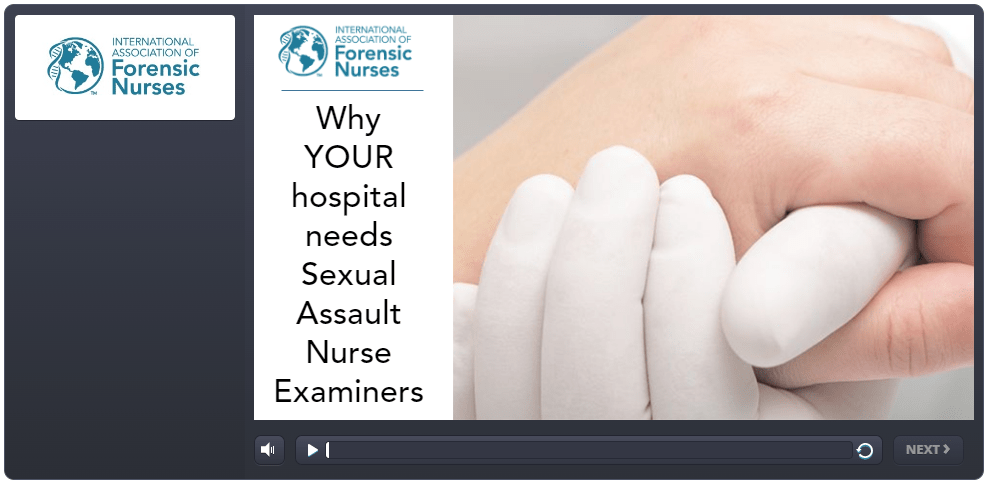
Caring for the Sexually Assaulted Patient When There is No SANE in Sight: A Training for ALL Healthcare Providers
This two-hour course is FREE and open to everyone!
Course Outline
– The Neurobiology of Trauma
– The Coordinated Community Response
– The Medical Forensic Examination
– Courtroom Testimony
CNE credits are available at no cost upon completion of the course through IAFN
If you are interested in using this program on your own e-learning platform, please complete the request form by clicking here for a free SCORM version of the product.
Build it and they will come
More than 2 million people are treated for violence-related injuries each year in the United Statesi, costing hospitals and health care systems approximately $2.7 billion annuallyii.
Forensic nurses are a critical component to address the health and legal needs of these patients.
Establishing a sustainable Forensic Nurse Examiner/Sexual Assault Nurse Examiner program will enhance the mission and vision of your facility while improving patient outcomes through the provision of comprehensive care to patients who have experienced violence.
What is a forensic nurse?
Forensic Nurse Examiners (FNEs) are registered or advanced practice nurses who have received specialized education to address the acute and long-term physical and mental health needs of patients affected by violence. These individuals may be victims of sexual assault, intimate partner violence, child and elder maltreatment, human trafficking, strangulation, and accidental as well as non-accidental injury. Forensic nurses are also utilized in risk management to address and improve patient and staff safety. Forensic nurses bridge the medical and legal needs of patients. Click here to learn more.
Benefits of a forensic nursing program
Research showsiii the positive impact of a forensic nursing response to patients experiencing violence, including promoting psychological recovery, reducing long-term health sequelae, and providing comprehensive and consistent medical care.
Forensic nurses:
- Empower patients by providing them with informed options and choices about their medical care, while offering a comprehensive medical forensic examination
- Identify and thoroughly document any injuries and findings during the medical forensic
- Collect and document forensic evidence completely and accurately and more effectively that the untrained clinician
- Provide pregnancy, sexually transmitted infection, and HIV prevention
- Provide fact and expert testimony in court proceedings
- Create community change by bringing multiple service providers together to provide a patient-centered, trauma-informed response to patients experiencing violence
How to develop a forensic nursing program
IAFN offers one-on-one support to forensic nurses as well as hospitals and administrations seeking to create, maintain, or grow a forensic nursing program. Each forensic nursing program is unique based on the communities they serve and the patient population they aim to treat. Visit the resources below to learn more and contact us when you are ready to get started at SAFEta@forensicnurses.org or 1-877-819-7278.
Next Steps
Start here: No SANE in Sight – Free training with CE for your hospitalSANE Program and Development Operational Guide
SANE 365 Resources for starting and managing your SANE program
Safeta.org – free training and support for your team
Medical Forensic Exam Payment Resources and Tool

iHaegerich, T. M., Dahlberg, L. L., Simon, T. R., Baldwin, G. T., Sleet, D. A., Greenspan, A. I., & Degutis, L. C. (2014). Prevention of injury and violence in the USA. Lancet (London, England), 384(9937), 64–74. https://doi.org/10.1016/S0140-6736(14)60074-X
iiVan Den Bos, J., Creten, N., Davenport, S., & Roberts, M. (2017). Report for the American Hospital Association. Cost of Community Violence to Hospitals and Health Systems. Retrieved from: https://www.aha.org/guidesreports/2018-01-18-cost-community-violence-hospitals-and-health-systems.
iii
Campbell, R., Bybee, B., Ford, J. K., & Patterson, D. (2008, April). Systems change analysis of SANE programs: Identifying the mediating mechanisms of criminal justice system Impact, http://tinyurl.com/y9zbjn4,
Du Mont, J., Macdonald, S., White, M., Turner, L., White, D., Kaplan, S., & Smith, T. (2014). Client satisfaction with nursing-led sexual assault and domestic violence services in Ontario. Journal of Forensic Nursing, 10(3), 122-134. https://doi.org/10.1097/JFN.0000000000000035
